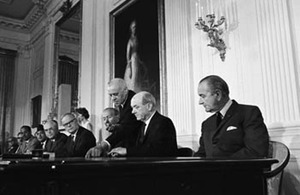UK Statement at the Second Session of the 2015 Non-Proliferation Treaty Review
National Statement on the UK's Commitment to a Middle East WMD free Zone delivered by Jo Adamson, UK Ambassador to the Conference on Disarmament in Geneva

The Non-Proliferation Treaty was signed on 1 July 1968
Speaking in a national capacity on behalf of the UK, I would like to make the following additional remarks,
The United Kingdom is committed to the objective to establish a Middle East zone free of nuclear weapons and all other weapons of mass destruction. We take our role as a Co-Convenor very seriously. We recognise the importance of the 1995 resolution on the Middle East, and of the NPT 2010 Review Conference Final Document and Action Plan, including the call for a Conference on the Middle East WMD Free Zone.
The impetus for the establishment of a weapons of mass destruction free zone in the Middle East must come from the states of that region. As the 2010 NPT mandate makes clear, a WMD free zone can only established on the basis of arrangements freely arrived at by the states of the region. It cannot be imposed from the outside. My government aspires to convene a successful conference, attended by all the states of the region, in conformity with the 2010 mandate.
UK Foreign Office Minister, Alistair Burt, on 24 November 2012, expressed our regret that it was not possible to hold the Conference in 2012, but also set out the United Kingdom’s commitment a Middle East WMD Free Zone and made clear that we would like to be able to convene the conference as soon as possible in 2013.
We continue to strongly support the work of the Facilitator, Jaakko Laajava. The 2010 mandate tasked the Facilitator to conduct consultations and prepare the conference. The Facilitator has worked tirelessly and creatively in line with that mandate. Having conducted close to 200 visits across the region, he has sought to build agreement between the States of the region on the modalities for a conference. The UK continues to firmly believe that the Facilitator, who is in touch with all the states of the region, is best placed to judge where consensus can be found on arrangements for the conference.
The UK has been working hard since the 2012 PrepCom to move the process forward in a way that builds the necessary consensus. We have provided financial backing, to the work of the Facilitator. Led by the Foreign Secretary, UK Ministers and officials have:
- discussed the Middle East WMD Free Zone with counterparts from the region;
- made clear our support for the Middle East Zone in a series of press articles;
- provided funding for a range of civil society events, to build understanding between all parties;
- supported the two EU-sponsored seminars on the Middle East Weapons of Mass Destruction Free Zone.
In conclusion, we will continue to support the Facilitators ongoing consultations and preparations for a successful Conference. We believe that preparatory consultations could play an important contribution on agreeing conference modalities, on the basis of consensus. We also believe that more preparation and direct engagement between States of the region is needed, and we, with our fellow Co-Convenors and the Facilitator, will continue to engage with the States of the region to build consensus on next steps. We hope that a conference will be held as soon as possible this year.